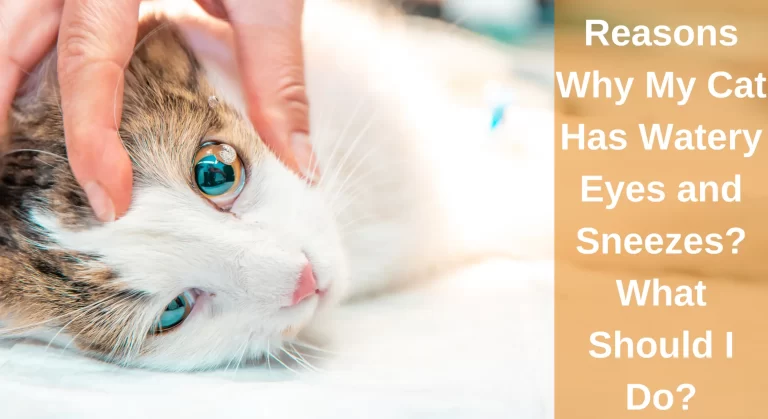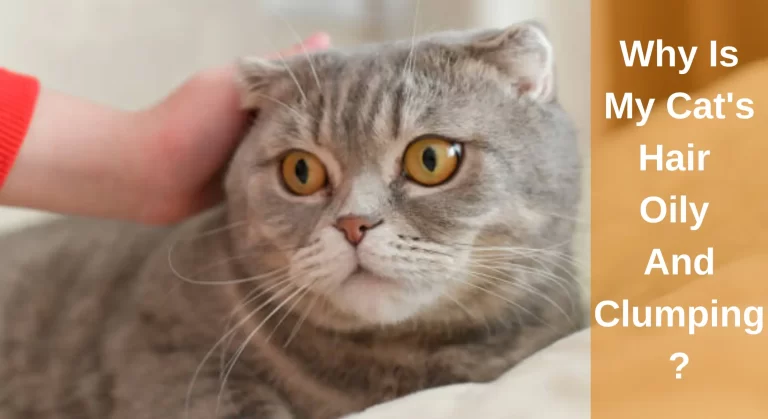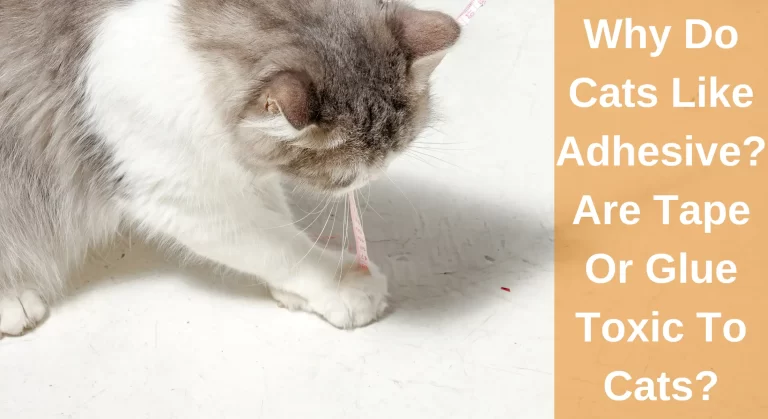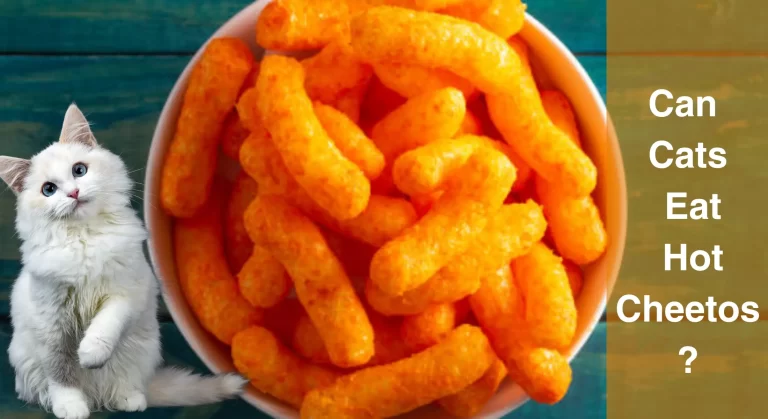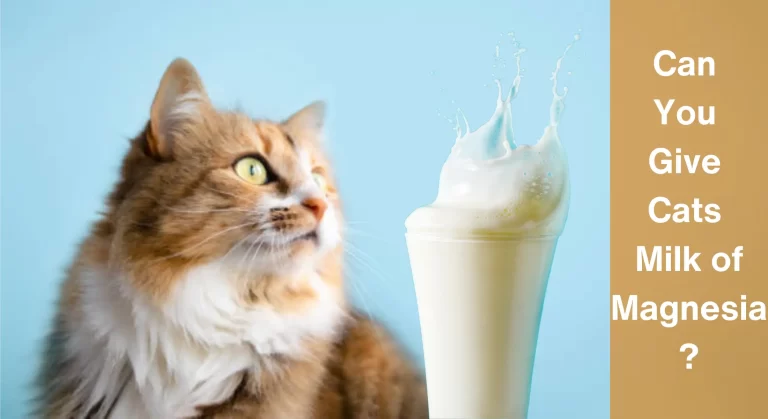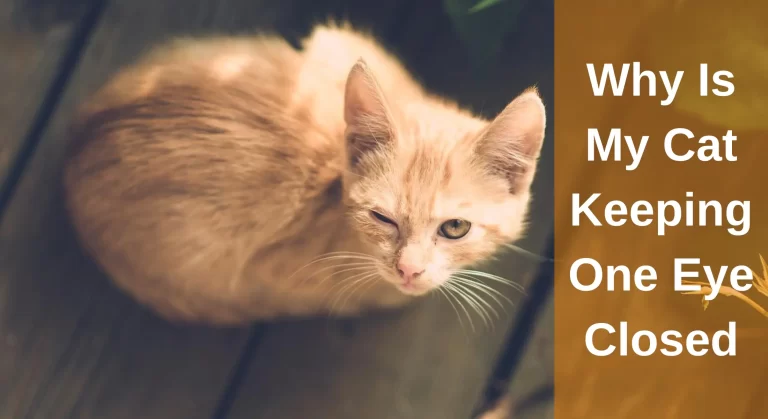Why Is My Cat Always Hungry But Skinny? What You Need To Know
You should be concerned if your cat consumes a lot of food yet appears underweight. People are aware that overeating leads to weight gain, so it is unclear how a cat may binge and still keep its trim figure.
Why is my cat always hungry but skinny? Possible causes of a cat’s hunger and leanness include parasitic worms, which devour any food taken. Because conditions like diabetes, hyperthyroidism, and inflammatory bowel disease prevent food from being adequately digested, cats can eat a lot and lose weight. Make sure no other animal is eating its food as well.
A disruption in the energy flow is the root cause of everything. To maintain its weight, a cat has to use more energy than it absorbs. As a result, one of the following is probably true for a cat that eats a healthy amount of food. Also, they have a greater metabolic rate during rest.
Some of the most common causes of weight loss in cats that are still eating a lot are discussed below.
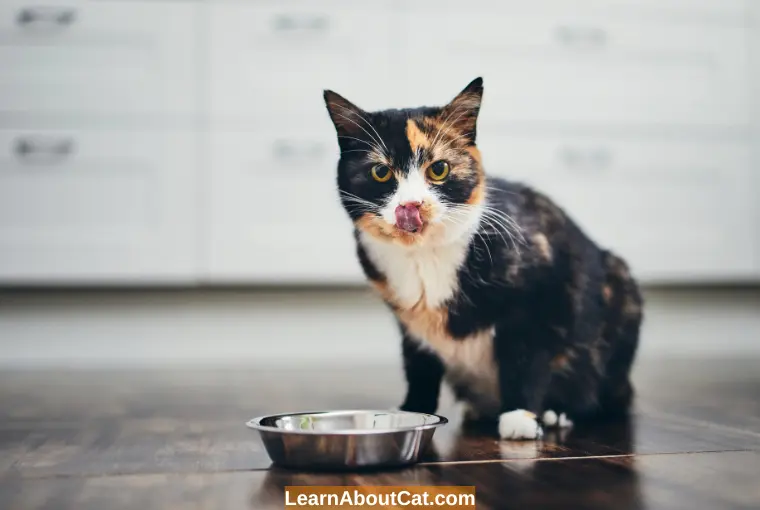
Why is My Cat Always Hungry?
In answering this question, psychological and physiological factors are involved. Despite the fact that the cause of polyphagia isn’t always clear, the following conditions might occur:
1. Calorie Deficit
Perhaps your cat is starving to death. This can be due to you not giving it enough food, another animal stealing its food, or a significant increase in its energy needs.
2. Malnutrition
If you provide your cat with enough calories but not enough essential nutrients, it might develop constant food demands.
3. Health Concerns
If you’ve seen weight loss and an increase in appetite in your cat, they most likely have an ailment or sickness. If a cat is suffering from a disease, e.g. Renal disease will greatly impact the cat’s overall health. Old cats have more health issues compared to their young ones.
Find Out: Why Is My Nursing Cat Always Hungry? [Answered]
4. Psychological and Emotional factors
If your cat is lonely or bored, it may find that begging for food attracts more attention. If they don’t have access to other types of stimulation and enrichment, felines may become dependent on the sensory pleasure of eating.
However, you could see some weight gain if your cat is overeating as a result of psychological issues.
Why Is My Cat Eating A Lot But Losing Weight?
Weight loss in cats despite having a good appetite can be indicative of an underlying medical condition. Here are some possible causes:
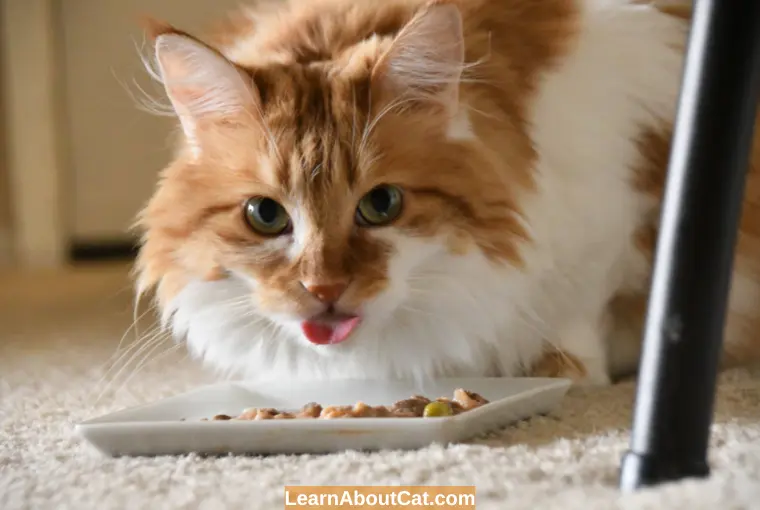
1. Inappropriate Cat Diet
Your cat’s weight loss might be the result of an improper diet, one that doesn’t meet its calorie requirements or activity level, for example. This could occur if a really active cat isn’t receiving enough food.
While you might be feeding your cat the right quantity of food, if the quality of the food is lacking, he may not be getting enough nutrients to stay nourished and happy.
Feeding your pet low-quality cat food or leftovers will lead to weight loss particularly if you are feeding him with low-quality cat food.
Furthermore, if you fail to provide your cat with adequate amounts of iron, magnesium, and vitamin B12, its appetite may not be sustained for long.
Check to see if the feeding suggestions match your cat’s ideal body weight according to the packet. Additionally, remember that certain cats require a little more or a little less than the suggested quantities (depending on how active they are).
2. Feeding Schedule
If your cat’s hunger seems uncontrollable, you may need to change how often you feed it. A cat is a creature of habit, which means that they like consistency in its feeding schedule. Otherwise, they can beg for food continuously if there is no structure in their eating schedule.
Cats like eating throughout the day as snacks. If you feed your cat four to eight little meals throughout the day at regular intervals, they won’t feel as hungry.
You should be consistent when feeding your cat if you want it to be happy. If you keep them waiting for hours, they’ll be ravenous by the time they get the food.
It is possible that your cat will develop psychogenic abnormal feeding behaviour if you have an irregular feeding schedule, causing them to steal food, binge eat, and pester you for food all the time.
Intresting Reading: Should I Leave Food Out For My Cat At Night?
3. Thyroid Issues
Elderly cats sometimes develop hyperthyroidism, an endocrine disorder. When a cat’s thyroid gland in its neck secretes too much thyroid hormone, it causes this condition. Because of this, metabolism and appetite are increased.
Besides vomiting and hyperactivity, hyperthyroidism also causes panting and other symptoms. As for the course of therapy, medicines may occasionally be used to stabilise the illness. Alternatively, other options could be suggested, such as radioactive iodine therapy or surgery.
Also Read: Signs Your Cat is Dying of Thyroid Disease
4. Diabetes
In older cats, type 2 diabetes mellitus is typical. When the pancreas cannot make enough insulin or when cells react improperly to insulin, felines become diabetic.
When the pancreas cannot make enough insulin or when cells react improperly to insulin, felines become diabetic.
At the same time, people always need more since they’re never content, which increases their appetite. Vomiting and extreme thirst, both of which result in dehydration, are further signs of diabetes.
Studies have shown that chronically high blood sugar can reduce your cat’s appetite, typically due to inadequate diabetes management. In addition, you should be aware of increased urination and thirst. So, It is important to have your cat checked out by a professional.
5. Cancer
- A malignant tumour may compress the GI tract. If digestion is hampered, the cat may become more ravenous than normal.
- IGF-1, a hormone secreted in excess by some malignant tumours, can increase the cat’s metabolism. This inevitably makes it more challenging to sate their appetite.
Cancer, however, affects cats’ appetites and is less prevalent than many other illnesses. Your cat may have psychogenic aberrant eating behaviour if it is provided with a high-quality diet, is in good physical shape, and constantly begs for food.
6. Feline Inflammatory Bowel Disease
The gastrointestinal tract of cats is affected by feline inflammatory bowel disease, and the stomach, intestines, oesophagus, and colon can all be affected.
Inflammation prevents foods from being absorbed properly, so they are thrown up in foamy vomit or come out in loose stools. The cat won’t be able to absorb enough nutrition from its food. As a result, your pet may become unusually hungry because his food isn’t providing him with enough nutrition.
Although the cause of FIBD remains a mystery, researchers suspect that genetics, bacteria, parasites, stress, and food allergies may play a crucial role.
Check Out: Why Is My Cat Throwing Up Food But Acting Normal?
7. Worms
Parasites are occasionally to blame for inflammatory bowel disease. Parasitic worms, including hookworms, roundworms, and tapeworms, interfere with digestion and increase cats’ appetite. Outdoor cats tend to get worms more frequently.
The risk of contracting worms increases if you have other pets in your household or your cat regularly plays outside. Worms can be transferred by fleas or from faeces in the soil.
In most cases, the easiest way to detect worms is to examine your cat’s stools or vomit. Worms are typically white/grey in colour, although they aren’t always visible at first glance.
It is imperative that worms are properly treated, as they can cause weight loss, malnutrition, and even death if not managed.
8. Chronic Kidney Disease
Chronic kidney disease is a common condition in older cats. As the kidneys are responsible for filtering waste from the body, a malfunction can cause toxins to accumulate in the bloodstream, leading to weight loss, even if the cat has a good appetite.
9. Feline Acromegaly
Because cats with acromegaly have problems maintaining a normal blood glucose level, diabetes and acromegaly are connected. As a result, it will always feel hungry and thirsty and may also show other signs of diabetes.
When the pituitary gland produces excessive amounts of growth hormone, it causes feline acromegaly, which manifests some physical changes such as a wide face, extended lower jaw, bloating and disproportionately large feet.
You should see a veterinarian if you notice these bodily changes including an increase in appetite or thirst. If acromegaly is shown to be present in your cat, the intensity of the symptoms can be controlled.
How Much Should Cats Weigh? – Ideal Weight for Cats
It shouldn’t matter if your cat is overweight or underweight as long as they are healthy. Your cat’s age, breed, and gender will determine what weight is considered healthy for it. There is, therefore, no established ideal weight for cats.
But by considering your cat’s age, breed, and medical conditions, you may select a healthy weight range for her and ensure that she stays within it.
You Might Like to Read: How Much to Feed a Kitten?
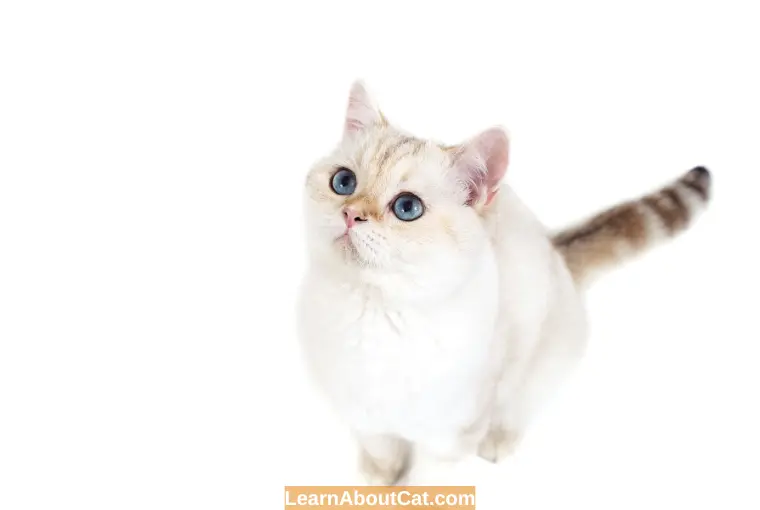
How to Tell if Your Cat Is Overweight
An overweight cat could be harder to distinguish from another unless she is quite obese. You must thus look for different signals instead.
The most evident visual sign of an overweight cat may be the lack of an abdominal tuck, which obscures your ability to detect the cat’s waist.
Her stomach will also be visible, and it can droop depending on how overweight she is. An overweight cat will also have limbs that seem fat and lack body definition.
Also, Check Out: How to Help a Cat Lose Weight with Multiple Cats?
How to Tell if Your Cat Is Underweight
Underweight cats frequently have very little to no fat, which makes it simple to see their ribs, spine, and hip bones. Underweight cats have tucks that are so deep that the area around the belly almost looks empty. (However, as I’ve already mentioned, a cat with roundworms may have stomach growth.) Underweight cats’ lack of muscle makes their legs appear skinny rather than athletic and muscular.
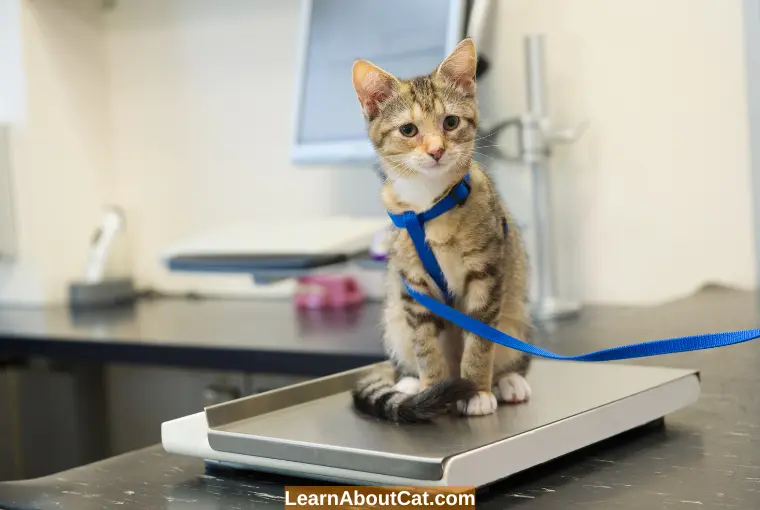
If your breed of cat has long hair and you are having problems distinguishing these traits, try gazing at your cat with your hands. This may be more difficult since, unless you have a cat that is quite overweight, you can easily feel your cat’s ribs, spine, and hip bones.
What to Feed a Cat to Help Them Gain Weight?
If you have a cat that needs to gain weight, there are several steps you can take to help them put on a healthy weight. Here are some tips on what to feed a cat to help them gain weight:
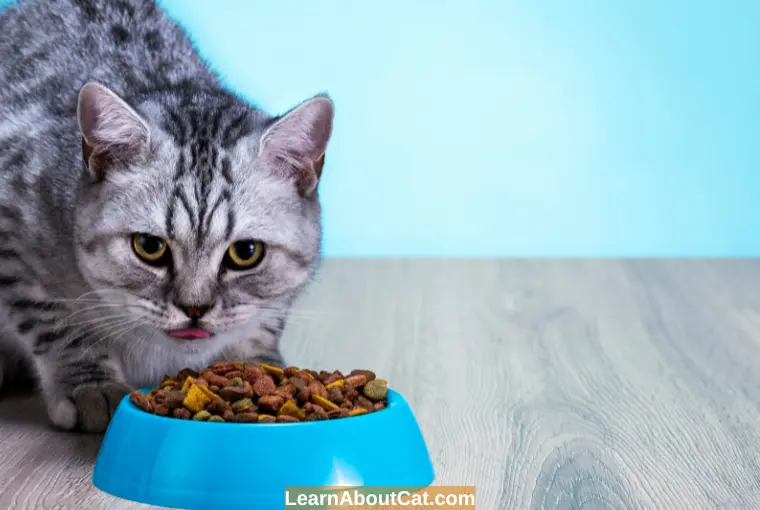
1. Increase portion sizes
First, make sure you’re feeding your cat enough. If you’re currently feeding them less than the recommended amount, increase their portion sizes gradually.
2. Choose a high-calorie cat food
Look for cat foods that are high in calories and protein. These can include kitten food, which is designed to help young cats grow and put on weight, or cat foods that are specifically formulated for weight gain.
3. Feed your cat more often
Try feeding your cat smaller meals more frequently throughout the day. This can help them eat more overall without overloading their digestive system.
4. Add wet food to their diet
Add wet food to their diet: Wet cat food is often higher in calories than dry food and can be more appealing to cats who may have lost their appetite. Consider adding wet food to your cat’s diet, or mixing it with their dry food.
5. Offer treats
Giving your cat high-calorie treats throughout the day can help them gain weight. Just make sure you don’t overdo it and that the treats are still balanced and nutritious.
6. Consult with a veterinarian
If your cat is struggling to gain weight despite your efforts, it’s important to consult with a veterinarian. They can rule out any underlying health issues and offer specific recommendations for your cat’s individual needs.
Find Out: Cat Not Eating or Drinking- How Long Can a Cat Survive?
Frequently Asked Questions
How to tell if your cat is a healthy weight?
So, what should a healthy cat look like, and what size should it be? Again, I’m unable to give you a scale figure because the appropriate weight for a given breed, sex, and age may vary. You can determine when a cat is at its optimal weight by looking at her, just like I’ve mentioned with underweight and overweight cats.
A cat that is healthy will have a balanced appearance throughout its body. She won’t display any anomalies whether you see her from the top or the sides. She won’t have a protruding belly; love handles on either side or hollowed-out sides from her low weight. The limbs won’t be too slender, either.
What causes polyphagia and weight loss in cats?
The most prevalent signs of feline polyphagia are as follows:
1. Ravenous appetite (whining and pleading for food).
2. Become aggressive in obtaining food.
3. Taking food from the refrigerator, cupboards, or bowl of another pet
4. Regurgitates (Eating too quickly lead to vomiting)
5. Weight changes (Decrease muscle)
5. Increased thirst
6. Ingesting non-food items, such as dirt
7. Hyperactivity
8. If so, a digestive or endocrine problem is to blame for your cat’s excessive eating.
Final Words!
Remember that reducing weight is frequently a gradual process. It could be challenging to identify if your cat is often eating. This is why it’s crucial to regularly check your cat’s faeces, give her routine parasite medication, and make an effort to observe any physical changes, such as how her coat, teeth, or movement change.
It’s important to keep an eye out for any behavioural changes that might be signs of fatigue, stress, poor self-care, or irregular sleeping patterns.
All of these signs may indicate a medical condition in your cat that is resulting in weight loss and a dip below a healthy level. Take your cat to the veterinarian for a complete checkup as soon as you detect any changes in your cat’s behaviour or appearance.
This will allow you to diagnose your cat’s condition and determine whether any problems are currently present. Do not postpone taking your cat to the clinic since weight loss requires time. Quick treatment is even more important because it’s possible that the condition is already somewhat advanced.
Related Posts:
Who is Isabella?
My name is Isabella, and I am a dedicated and knowledgeable cat enthusiast. With years of experience caring for cats and a deep love for felines, I made a mission to help other cat lovers navigate the challenges of cat ownership.

